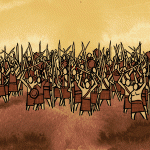by Cray Allred
The sport of football faces an uncertain future. More and more research is revealing the dangers concussions pose to the brain, lawsuits from former players are seeking billions of dollars in damages from the NFL, and parents are increasingly hesitant to allow their children to participate in youth football. Christians have even begun wondering if the violence inherent to the sport makes fandom problematic, since we’re supposed to value the human body over gladiator-style entertainment. Owen Strachan recently gave an overview of these questions at Christianity Today.
The practice of playing fantasy football hasn’t typically received the same moral treatment as, say, jumping and shouting when a player gets crushed on your TV screen. Aside from the gambling ramifications of playing in a fantasy league—with one “owner” of a smattering of random players competing to rack up more statistics than another owner’s made-up roster—the ethical questions seem more detached from the grizzly hits and scary cart-offs. It is essentially competitive predictive math, and it doesn’t even require that you watch actual games from week to week. But that, I think is the biggest problem with playing fantasy football: the detachment.
Much like the NFL, where contracts aren’t guaranteed and players can get tossed to the curb the moment their bodies are too worn down, fantasy owners add and drop players to and from their rosters on at least a weekly basis. If one player is underperforming, he might be cut for someone playing better at the time. And the moment that a notable player is hurt, he is immediately dropped, while the entire fantasy league makes a mad dash to grab his backup.
If a player blows out his knee and ends his season, the best-case scenario is that his fantasy owners are bummed and move on. Trust me, they are not checking in on his status to see how he’s doing—unless they’re researching his health for the next year, when he will be useful to them again. The worst-case scenario? A fantasy owner harbors actual animosity towards another human being for getting hurt.
Having played fantasy football for years and wading through a comments section or two attached to an injury update, I can say that the worst-case scenario is disturbingly more common. Some fantasy players whine about their teams’ misfortunes due to so-and-so letting them down by missing a game. Almost all fantasy players use labels like “injury-prone” or “risky” to discuss the worth of players they do or don’t like, and most will roll their eyes or engage in trash talk based on their expert medical opinion of a player (“Enjoy Darren McFadden…until he breaks a hip in week 4!”). Sadly, I’ve found myself reacting with relief or even delight when a player on an opposing fantasy roster goes down with an injury.
While being a fan of a real team can conjure all kinds of unhealthy attitudes, there is an attachment to your team’s players that doesn’t exist in fantasy. If Peyton Manning gets injured, Broncos fans are tied to his recovery and (ideally) spend more of their energy wishing him the best than grumbling about his absence. Ask anyone who has played fantasy whether they’ve ever said they “hated” or “couldn’t stand” an NFL player because of some injury, and they will likely admit to a more flippant view of these athletes when it pertains to their fantasy team. If we’re dealing with a real salt-of-the-earth fantasy owner, they might refrain from bashing injured players, reserving their disdain for healthy guys who don’t rack up as many yards or touchdowns as expected. Arian Foster, a fantasy star who has received plenty of online hate when he has dared to lose playing time to injury, described this situation well: we are sick.
The use-’em-up-and-throw-’em-away nature of professional football is enhanced by the facelessness of the athletes; football players are hidden behind facemasks and bulky pads, while other major sports feature close-ups of players’ faces after almost every play. The expendability of a football player is also a statistical reality: the average NFL career lasts less than four years. Millions of youth football players funnel into thousands of collegiate players, a crop that churns out hundreds of NFL rookies each year. The spectacle of these men running, throwing, catching, and crashing into each other is by far the most-watched form of entertainment in our culture, which more than justifies the cost of the broken bodies and brains that litter the funneling process for advertisers, owners, and media. If we take a step back and look, is fantasy football not another way we are callously prioritizing entertainment above the well-being of others?
Cray Allred is a wandering English major who manages grants for an association of non-profits. He spends the rest of the time feeling undeserving of his beautiful wife and daughters, being loved and fed at his church, and vicariously balling via an over-consumption of hoops and hip hop.
photo credit: MattBritt00 via photopin cc











